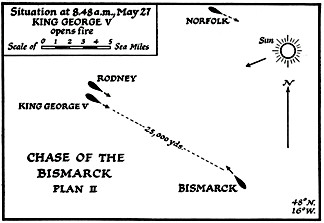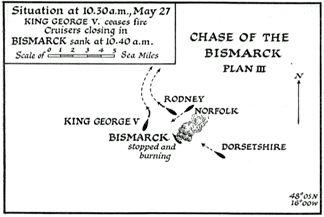The Grand Alliance (65 page)
Read The Grand Alliance Online
Authors: Winston S. Churchill
Tags: #History, #Military, #World War II

The Grand Alliance
395
But now Captain Vian, of
Altmark
fame, still in the
Cossack,
with four other destroyers which had been escorting the troop convoy and had been ordered to leave it, received a signal from a Catalina aircraft which gave him the
Bismarck’s
position. Without waiting for further orders he at once turned towards the enemy.
Further confusion was in store in this clutching and grabbing scene. Admiral Somerville, hastening northward, sent on the
Sheffield
to close and shadow the enemy. The
Ark Royal
was not informed of this movement, and when she launched her air striking force their radar led them to the
Sheffield,
which they attacked but did not hit. The
Sheffield,
understanding the mistake, dodged successfully and did not fire.
2
The airplanes, penitent, returned to the
Ark Royal,
and the
Sheffield
gained contact with the
Bismarck
and henceforth held her for sure. Fifteen Swordfish again left the
Ark Royal
a little after 7 P.M. The


The Grand Alliance
396
enemy was now less than forty miles away, and this time there was no mistake. Directed on their prey by the forgiving
Sheffield,
they pressed home their attack with determination. By 9.30 their work was done. Two torpedoes had certainly hit, and possibly a third. A shadowing aircraft reported that the
Bismarck
had been seen to make two complete circles, and it seemed she was out of control.
Captain Vian’s destroyers were now approaching, and throughout the night they surrounded the stricken ship, attacking with torpedoes whenever the chance came.
On this Monday night I went to the Admiralty and watched the scene on the charts in the War Room, where the news streamed in every few minutes. “What are you doing here?”
I said to the Controller, Admiral Fraser. “I am waiting to see what I have got to repair,” he said. Four hours passed The Grand Alliance
397
quickly away, and when I left I could see that Admiral Pound and his select company of experts were sure the
Bismarck
was doomed.
The German commander, Admiral Lutjens, had no illusions.
Shortly before midnight he reported, “Ship unmanoeuvrable. We shall fight to the last shell. Long live the Fuehrer!” The
Bismarck
was still four hundred miles from Brest, and no longer even able to steer thither. Strong German bomber forces were now sent forward to the rescue, and U-boats hastened to the scene, one of which,
having already expended her torpedoes,
reported that the
Ark Royal
had passed her within easy striking distance.
Meanwhile the
King George V
and the
Rodney
were drawing near. Fuel was a grave anxiety, and Admiral Tovey had decided that unless the
Bismarck’s
speed could be greatly reduced he would have to abandon the chase at midnight. At my suggestion the First Sea Lord told him to go on even if he had to be towed home. But by now it was known that the
Bismarck
was actually steaming in the wrong direction. Her main armament was uninjured, and Admiral Tovey decided to bring her to battle in the morning.


The Grand Alliance
398
A northwesterly gale was blowing when daylight came on the twenty-seventh. The
Rodney
opened fire at 8.47 A.M., followed a minute later by the
King George V.
The British ships quickly began to hit, and after a pause the
Bismarck
too opened fire. For a short time her shooting was good, although the crew, after four gruelling days, were utterly exhausted and falling asleep at their posts. With her third salvo she straddled the
Rodney,
but thereafter the weight of the British attack was overwhelming, and within half an hour most of her guns were silent. A fire was blazing amidships, and she had a heavy list to port. The
Rodney
now turned across her bow, pouring in a heavy fire from a range of no more than four thousand yards. By 10.15 all the
Bismarck’s
guns were silent and her mast was shot away.
The ship lay wallowing in the heavy seas, a flaming and smoking ruin; yet even then she did not sink.

The Grand Alliance
399
At eleven o’clock I had to report to the House of Commons, meeting in the Church House, both about the battle in Crete and the drama of the
Bismarck.
This morning [I said], shortly after daylight the
Bismarck,
virtually at a standstill, far from help, was attacked by the British pursuing battleships. I do not know what were the results of the bombardment. It appears, however, that the
Bismarck
was not sunk by gunfire, and she will now be dispatched by torpedo. It is thought that this is now proceeding, and it is also thought that there cannot be any lengthy delay in disposing of this vessel. Great as is our loss in the
Hood,
the
Bismarck
must be regarded as the most powerful, as she is the newest, battleship in the world.
I had just sat down when a slip of paper was passed to me which led me to rise again. I asked the indulgence of the House and said, “I have just received news that the
Bismarck
is sunk.” They seemed content.
It was the cruiser
Dorsetshire
that delivered the final blow with torpedoes, and at 10.40 the great ship turned over and foundered. With her perished nearly two thousand Germans and their Fleet Commander, Admiral Lutjens. One hundred and ten survivors, exhausted but sullen, were rescued by us. The work of mercy was interrupted by the appearance of a U-boat and the British ships were compelled to withdraw. Five other Germans were picked up by a U-boat and a ship engaged in weather reporting, but the Spanish cruiser
Canarias,
which arrived on the scene later, found only floating bodies.
This episode brings into relief many important points relating to sea warfare, and illustrates both the enormous The Grand Alliance
400
structural strength of the German ship and the immense difficulties and dangers with which her sortie had confronted our very numerous forces. Had she escaped, the moral effects of her continuing existence as much as the material damage she might have inflicted on our shipping would have been calamitous. Many misgivings would have arisen regarding our capacity to control the oceans, and these would have been trumpeted round the world to our great detriment and discomfort. All branches rightly claimed their share in the successful outcome. The pursuit began with the cruisers, which led to the first disastrous action. Then when the enemy was lost it was aircraft that found him and guided the cruisers back to the chase. Thereafter it was a cruiser which directed the seaborne aircraft who struck the decisive blows, and finally it was the destroyers who harassed and held him through a long night and led the battleships to the last scene of destruction. While credit is due to all, we must not forget that the long-drawn battle turned on the first injury inflicted on the
Bismarck
by the guns of the
Prince of Wales.
Thus the battleship and the gun were dominant both at the beginning and at the end.
The traffic in the Atlantic continued unmolested.
To President Roosevelt I telegraphed on the twenty-eighth:
Former
Naval
28 May 41
Person to President
Roosevelt
I will send you later the inside story of the fighting
with the Bismarck. She was a terrific ship, and a mas-terpiece of naval construction. Her removal eases our
battleship situation, as we should have had to keep
King George V, Prince of Wales, and the two Nelsons
practically tied to Scapa Flow to guard against a sortie
of Bismarckand Tirpitz, as they could choose their
moment and we should have to allow for one of our
The Grand Alliance
401
ships refitting. Now it is a different story. The effect
upon the Japanese will be highly beneficial. I expect
they are doing all their sums again.

